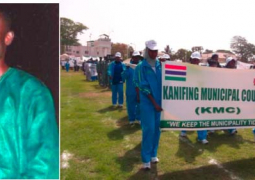Health Workers ranging from physicians, hospital administrators, medical directors, nursing officers, pharmacists among others from the length and breath of the country on Saturday gathered at the Baobab Holiday Resort on a day-long sensitization on pain management within the wider context of palliative care.
With funding from African Palliative Care Association (APCA), Foundation for Hospices in Sub-Saharan African (FHSSA) US, implemented by the Ministry of Health, Hand On Care and Hope For Life Cooperation and other local partners, the project goal and objectives centre others on improving pain management among palliative care patients receiving care in hospitals and other health care settings in The Gambia
Speaking at the forum, Dr. Saihou T. Sabally, Director, Hand On Care, noted that the initiative started in February 2011, in that five senior hospital administrations and pharmacist from the country attended a project initiative and planning in Kampala,Uganda, on improving of pain management in african countries including The Gambia, Kenya and Malawi
According to him, in May 2011, Hand On Care signed a sub-grant agreement with (FHSS) on palliative services delivering on behalf of the Ministry of Health supported by an MoU between it and non-government partners.
“The concept of palliative Care requires wider awareness and understanding amongst health workers,” asserted Mr.Sabally.
However, Mr Sabally spelt it out that the advocacy in pain management is not only in palliative care. He stated: “Pain management needs to be control for patients to have love for dignity.” He further urged participants to take care of patients with pain seriously.
“Effective pain management is a human right,” he told the gathering. The project, he said, is a national project and requires collaboration. He revealed that a national palliative care will be formed in The Gambia hoping that partners will also begin to assess and evaluate the implementation of the project and also train the national team on how to assess pain.
“We all recognize ain management in our hospitals,” he lamented.
“Palliative care, according to WHO definition, is an approach that improves the quality of the life of patients and their families facing the problem associated with life-threatening illness, through the prevent and relief of suffering by means of early identification and impeccable assessment and treatment of pain and other problems, physical, psychosocial and spiritual palliative care,” explained Joseph I. Awuru, executive director, Hope Life Cooperation. He gave a brief background of palliative care in The Gambia as well as the African Palliative Care Association contact with Gambian partners. He also revealed challenges for the establishment of the project in the country which among others includes lack of palliative care awareness and education among health workers to brace it, limited understanding of palliative care among the general public and lack of fund.He further noted that most people associate palliative care with only death.
Speaking earlier, the Director of Health, Dr. Momodou Cham. He called for awareness in pain management, adding: “Pain is a major reason people visit health care institutions.” He said the forum was an opportunity to have knowledge on pain management for people. He noted that the event is among series of activities that will be implemented after this. He reiterates his ministry support to the implementation of the project.
He also challengedparticipants to disseminate the knowledge gained to their various departments hoping that by so doing it will have a multiplier effect.
For his part, UNAIDS Rep, Nuha Ceesay, stated: “Taking the initiative or concept of strengthening the delivering of quality of health services is paramount.” The project, he admitted, was a step in the right direction with regard to health. He noted that the stages outlined will help a lot as success advocacy will also help colleagues under the remedy of what Palliative care is all about. He finally reiterated the support of the WHO and UNAIDS towards the initiative.
Read Other Articles In Article (Archive)

Sports Minister calls for revitalization of active and healthy lifestyle
May 4, 2015, 10:50 AM
Court issues bench warrant
Mar 10, 2010, 10:59 AM


